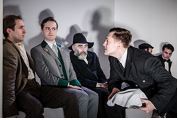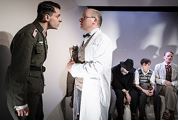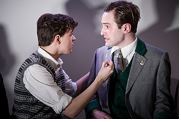Finborough Theatre Presents Arthur Miller's Incident at Vichy
Superb revival of neglected play strikes chords today, says Bill Hagerty
Ten men shut in a room ponder why they are there and what their fate might be. Within minutes their mounting apprehension and mutual distrust creates a tension that bridges the short distance between them and the audience, dispensing a state of high anxiety on its way. It’s the cue for 90 unbroken nerve-wracking minutes during which all present are required to look deep inside themselves.

Okay, it’s only a play. Indeed, one that when premiered in New York in 1964 was greeted with mixed reviews and audience indifference reflected by a run of just 32 performances.
Two years later in London it failed again on both fronts. Arthur Miller, with All My Sons, Death of a Salesman and A View from the Bridge having a decade earlier established him as a giant of American theatre, had this time failed to penetrate the public psyche.
Full marks then to director Phil Willmott, who when researching another project realised that Incident at Vichy was perhaps more topical than it had been in its original historical no-man’s-land of 20 years after the war’s end. Creepily so as the dialogue from a master phrasemaker prises open a can where the worms aren’t just still wriggling but resolved to escape their tin.

Miller had attended Nazi war-crimes trials in Frankfurt before producing a Holocaust play that wasn’t, in that it expanded its themes to include individual conscience and guilt, collective responsibility and the lack of it, the gullibility of those eager to embrace it and how civilised people could accept and even excuse horrors carried out in their names.
Set in 1942, the plot focuses on the men – mostly Jewish – after they have been swept off the streets in Vichy France ‘to have their papers checked’. They are treated contemptuously by an SS officer captor and his ‘racial anthropologist’ companion, less so by a front-line regular soldier who’d been wounded fighting the French in 1940.

Ranging from a psychiatrist and former front-line soldier to a terrified artist; from a communist electrician, recounting rumours of trainloads of Poles being despatched east to concentration camps, to an initially self-assured actor who won’t believe a word of it, they soon expose their vulnerability – and the terror of the unthinkable.
The more their lives unravel, the more warning bells ring in one’s head. "You get tired of believing in the truth," says the artist, and later an elderly, silent Jew, resisting as he is dragged away to interrogation, spills all over the floor the stuffing of the pillow he has constantly hugged, illustrating a Jewish parable where dispersing feathers represents the unstoppable spread of divisive propaganda. "Fake news," observes Willmott in his programme note.
Incident at Vichy settles flawlessly into today’s world, where blatant untruths and "alternative facts" appear to have become acceptable currency; where lies are believed or, even worse, considered immaterial if useful to winning the argument being pursued.

A stunning ensemble cast – Edward Killingback, as an Austrian prince whose understanding and ultimate bravery makes one believe there may be hope after all, deserves special mention – is to be congratulated for making every second count and every flesh creep.
Willmott’s note also recalls President-to-be Donald Trump confirming that he was open to requiring Muslims in the United States to register on a database and, when asked how such a database would be different from Jews having to register in Nazi Germany, replied:"You tell me."
Do go to see Incident at Vichy. But be prepared to be very afraid.
Incident at Vichy plays until 22 April. For tickets, call the box office on 0844 847 1652 or book online at Ticketweb.
Finborough Theatre is at 118 Finborough Road, SW10.
April 4, 2017
December 1, 2016
